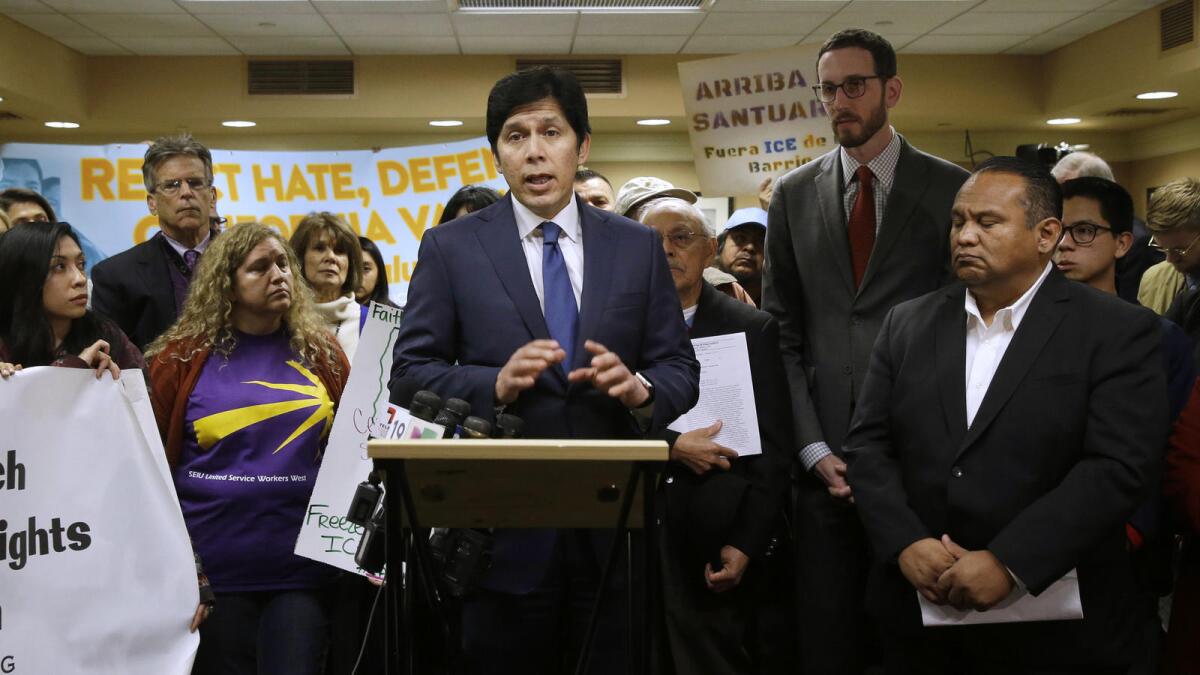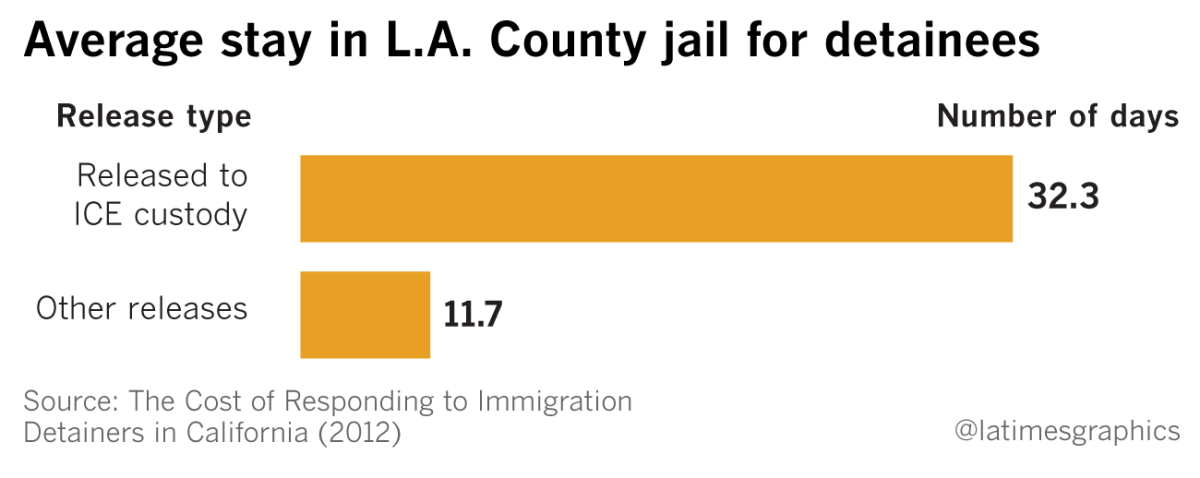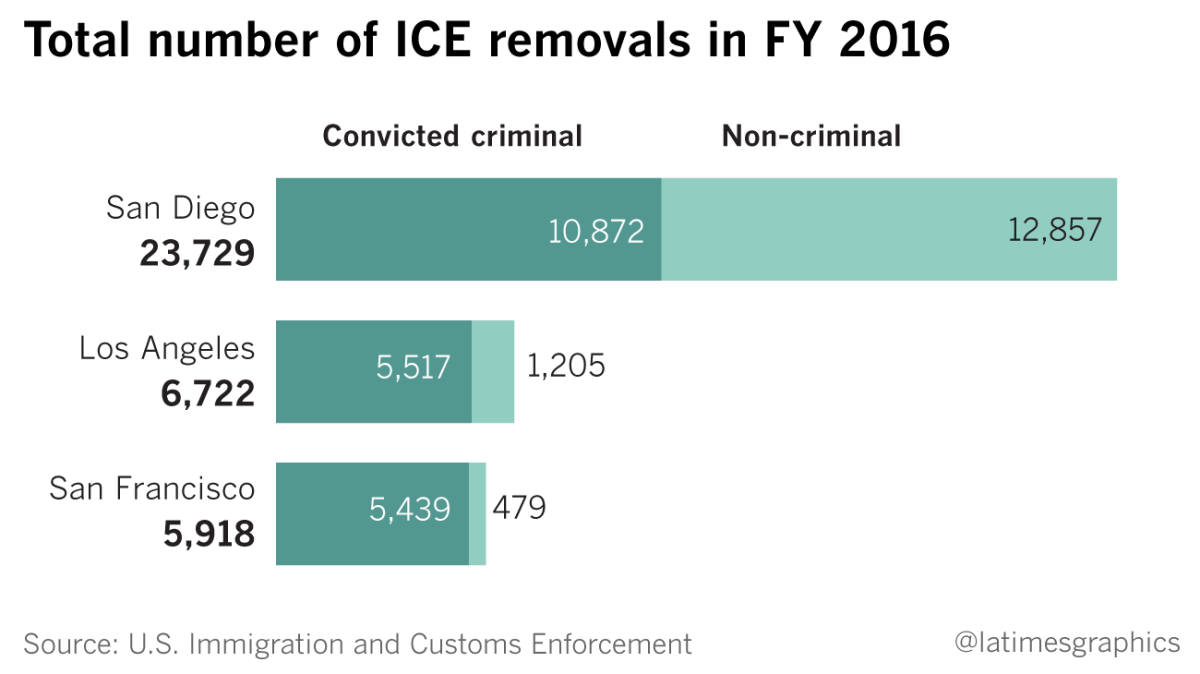What you need to know about California’s ‘sanctuary state’ bill and how it would work
- Share via
California state Senate leader Kevin de León introduced Senate Bill 54 on what was an unusually acrimonious first day of the 2017 legislative session, as lawmakers in both chambers were locked in bitter debate over the still newly elected President Donald Trump.

The proposal, known as the “sanctuary state” bill, was sparked by the Trump administration’s broadened deportation orders. It would expand so-called sanctuary city policies, prohibiting state and local law enforcement agencies, including school police and security departments, from using resources to investigate, interrogate, detain, detect or arrest people for immigration enforcement purposes.
But as President Trump and U.S. Atty. Gen. Jeff Sessions have threatened to slash federal funding from “sanctuary cities,” the state legislation is raising heated opposition from Republican lawmakers and sheriffs. They argue its provisions could strain the state’s finances and shield dangerous criminals.
Here’s what you should know about the bill.
1. It builds on an earlier law that provides protections to immigrants
De León has said his proposal builds on the California Trust Act, which Gov. Jerry Brown signed in October 2013. That state statute prevents law enforcement agencies from detaining immigrants longer than necessary for minor crimes, allowing federal immigration authorities to take them into custody.

Senate Bill 54 would prevent state and local agencies from complying with any “hold requests” to detain immigrants, for U.S. Immigration and Customs Enforcement. It would also prohibit state and local agencies from using their facilities, property, equipment or personnel for immigration enforcement, and from spending money on it. The agencies would be barred from:
- Collecting information about a person’s immigration status
- Responding to notification or transfer requests from federal immigration agencies
- Responding to requests for personal information that is not publicly available for the purpose of enforcing immigration laws
- Arresting people based on civil immigration warrants
- Giving federal immigration officers access to interview someone in their custody for immigration enforcement purposes
- Helping federal immigration officers search a car without a warrant
- Performing the functions of an immigration officer

2. It would establish ‘safe zones’ for immigrants
Within three months of Senate Bill 54 becoming law, the state Department of Justice would have to publish policies outlining what state and local law enforcement agencies can and can’t do to assist federal officials.
It would also create “safe zones” for immigrants by requiring all public schools, public libraries, courthouses and health facilities run by state or local government to implement those policies or “equivalent” regulations, though they would not have to be approved by the state. All other government-run organizations and entities that offer physical or mental health and wellness services, or that provide access to education, legal aid and social services, including the University of California, would be encouraged but not required to adopt the state policies.
3. Law enforcement officers would be able to work with task forces — so long as they’re not dedicated to immigration enforcement
To address some concerns from law enforcement, De León has added new amendments to his bill that would allow local and state officers to participate in task forces — and work alongside federal immigration officers — as long as their main purpose is not immigration enforcement.
Agencies that participate in a joint law enforcement task force would have to submit a report every six months to the state Department of Justice describing the types and frequency of arrests made by the task force. Within 14 months of the bill going into effect and twice a year thereafter, the state attorney general would have to publish the reports online.
4. Federal immigration officials would be notified when felons who have violent or serious convictions are released
Other changes to the bill by De León have attempted to address concerns from Republican lawmakers and sheriffs over the release of violent felons.
Federal law requires that electronic fingerprint records for all offenders booked into state prisons and local jails be sent to the FBI and to the Department of Homeland Security. ICE receives an electronic notification when DHS has previously entered an inmate’s information into its databases and determines whether the person is a priority for deportation. If so, it can request the arresting agency to hold or notify ICE before the person is let go.
Under Senate Bill 54, communication between ICE and state and local law enforcement agencies would be limited to passing on information about inmates who have previously been deported for a violent felony, or are serving time on a misdemeanor or felony and have a prior serious or violent felony conviction. State and local agencies would only be able respond to requests from ICE for other information if it is already available to the public.
Other recent amendments to the bill would require the State Parole Board or the California Dept. of Corrections and Rehabilitation to give ICE 60-days advance notice of the release date of inmates who have been convicted of a serious or violent felony, or those who are serving time for a nonviolent crime but have a prior conviction for violent or serious crimes.
Law enforcement officers also would be allowed to contact and transfer people to ICE, with a judicial warrant, if they come into contact with someone who was previously deported for a violent felony.

5. It’s unclear how much of a financial burden the legislation will be for state and local law enforcement agencies
The Senate Appropriations Committee has determined it would take a one-time cost of $2.7 million and ongoing costs of $2.3 million per year for the state to develop compliance policies, provide training and outreach to state agencies and compile task force reports as required by Senate Bill 54.
But the costs for local law enforcement agencies to change their existing procedures — and to end contracts with federal immigration agencies, some of which generate millions of dollars in revenue from leased jail space — are unknown, as is how much it will cost state agencies including courts and schools to implement the new policies. The committee has not been able to measure the potential loss in funding from Washington should the state refuse to cooperate with federal authorities.
The state is unlikely to reimburse local law enforcement agencies for their financial losses because while the bill would impose restrictions, it would not require them to develop new policies, programs or services, according to an analysis by the Senate Public Safety Committee. But the state would probably have to foot the bill for expenses accrued by local government operations, including school districts and county health facilities, which would be asked to devise new policies that limit cooperation with immigration enforcement.
6. Many sheriffs are vehemently opposed to the bill
The bill has drawn fierce opposition from sheriffs across the state, including Los Angeles County Sheriff Jim McDonnell and Sacramento Sheriff Scott Jones, who last month hosted a community forum on immigration enforcement with acting ICE Director Thomas Homan that drew a large crowd of protestors.
The sheriffs say the bill would severely limit communication and collaboration between local and federal agencies, forcing federal immigration officers to go into communities — instead of jails — when searching for immigrants who are a danger to public safety.
As the head of the nation’s largest sheriff’s department, McDonnell runs the largest jail system in the country, which houses approximately 18,000 inmates on any given day. Asst. Sheriff Kelly Harrington, who oversees the jail operation, has previously said federal immigration agents have access inside the county’s jail system every day. L.A. County jail officials last year handed over about 1,000 inmates to immigration agents — a small portion of the more than 300,000 people released from the county’s jails that year.
The sheriffs also argue the changes to the bill don’t address the potential loss of federal funding in counties that lease space to federal immigration agencies for detainees. An SB 54 opposition letter from Orange County Sheriff-Coroner Sandra Hutchens estimated that shortfall for her agency at roughly $22 million annually. Jones, who has said his department has $4.8 million in ICE contracts, insists his opposition stems from public safety concerns, not financial losses.
But no sheriff in California’s 58 counties is willing to hold inmates past their release dates for ICE, the Times has found. Several sheriffs said their defiance was not rooted in ethical or political opposition, but in concerns over federal court rulings, including a case in Oregon where a judge found that police violated a woman’s constitutional rights by keeping her in jail at the federal agency’s request.
7. Supporters argue the bill will protect vulnerable communities
Dubbed the California Values Act, Senate Bill 54 is at the center of a legislative package filed by Democrats in an attempt to protect more than 3 million people living in the state illegally. Other bills aim to protect immigrants’ religious affiliations and create a $12-million legal defense program for immigrants facing deportation who do not have a violent felony on their records.
The bill has drawn a long list of supporters, including Los Angeles County Supervisors Hilda Solis and Sheila Kuehl and Los Angeles Mayor Eric Garcetti. Other supporters include city officials from sanctuary cities like Santa Ana and Berkeley, immigrant advocates and Democratic lawmakers. They are urging opponents of the bill to move away from embracing Trump's rhetoric, which they say stereotypes immigrants as criminals, and are pointing to studies that reflect low crime rates in immigrant communities.
Los Angeles Police Chief Charlie Beck has said he supports with the legislation’s “underlying tenets,” but wants to ensure it does not protect criminals.
Meanwhile, some university police chiefs have supported the bill from the beginning, saying fear can keep witnesses and victims to crimes from coming forward. A 2013 study conducted by the University of Illinois found 44% of Latinos are less likely to contact police if they have been a victim of crime because they fear that police officers will ask about their immigration status.
Twitter: @jazmineulloa
ALSO
Controversial 'sanctuary state' bill clears major hurdle after hours of debate
Updates on California politics
UPDATES:
12:01 p.m.: This article was updated to reflect that law enforcement agencies are allowed to notify immigration officials about inmates with prior violent felony convictions.
This article was originally published at 12:00 a.m.
Get the L.A. Times Politics newsletter
Deeply reported insights into legislation, politics and policy from Sacramento, Washington and beyond. In your inbox three times per week.
You may occasionally receive promotional content from the Los Angeles Times.








